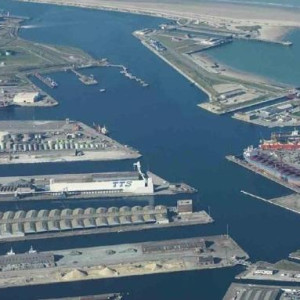Dunkirk rail-road terminal to transfer 50,000 HGV loads a year to rail


The first regular service from the terminal will link Dunkirk to Piacenza in Italy, via Lyon, operated by Modalis subsidiary Delta Rail. Located on 9.6 hectares along the Loon-Plage railway line, at the heart of a dense industrial zone and close to the Great Britain & Ireland Ro-Ro terminals, this new terminal aims to play a key role in reducing congestion on the roads, cutting CO2 emissions and optimising the flow of goods. The terminal will enable the rail transport of road semi-trailers and swap bodies (ITUs) over long distances, reducing the use of road-only transport.
It aims to transfer road traffic generated by RoRo, logistics and industrial activities in the Dunkirk area and beyond to rail. It has a large storage area that can accommodate more than 600 transport units - swap bodies and trailers. The partnership calculates up to 50,000 ITUs could be taken off the road each year, avoiding nearly 70,000 tonnes of CO2.
This rail corridor will connect the industrial basins of northern and southern Europe, with logistical continuity to the UK, via the shipping lines operated by DFDS between Dunkirk, Dover and Rosslare. Open to all rail operators, the terminal can receive up to four 750 m long freight trains that are capable of transporting the equivalent of 130 to 150 semi-trailers. Completed in less than two years, this EUR25m project, co-funded by the two partners, aims to ramp up the decarbonisation of continental freight transport, and is part of a wider plan in France and across European Union to boost their energy transition and reindustrialisation policies.
Maurice Georges, Dunkerque-Por chairman said: "Thanks to this project, we are maintaining the smooth flow of land transport services to the port and its surrounding area, while also contributing to European targets for long-distance modal shift. This is a decisive step towards more sustainable and efficient logistics." Bernard Mei, Modalis Group chairman, added: "The complementarity between the logistics, port and rail ecosystems is one of the major challenges of decarbonisation. The seaports have an essential role to play in intermodal arbitrations: 80% of goods arrive through them and the choice is then made to use rail, water or road transport.
"Equipping the ports with modern modal shift infrastructure and efficient handling vehicles will guarantee mass freight demand throughout France.
The Modalis Group is very proud to be able to contribute alongside Dunkerque-Port to this decarbonisation project and strengthen its ecosystem through the use of multimodal terminals."